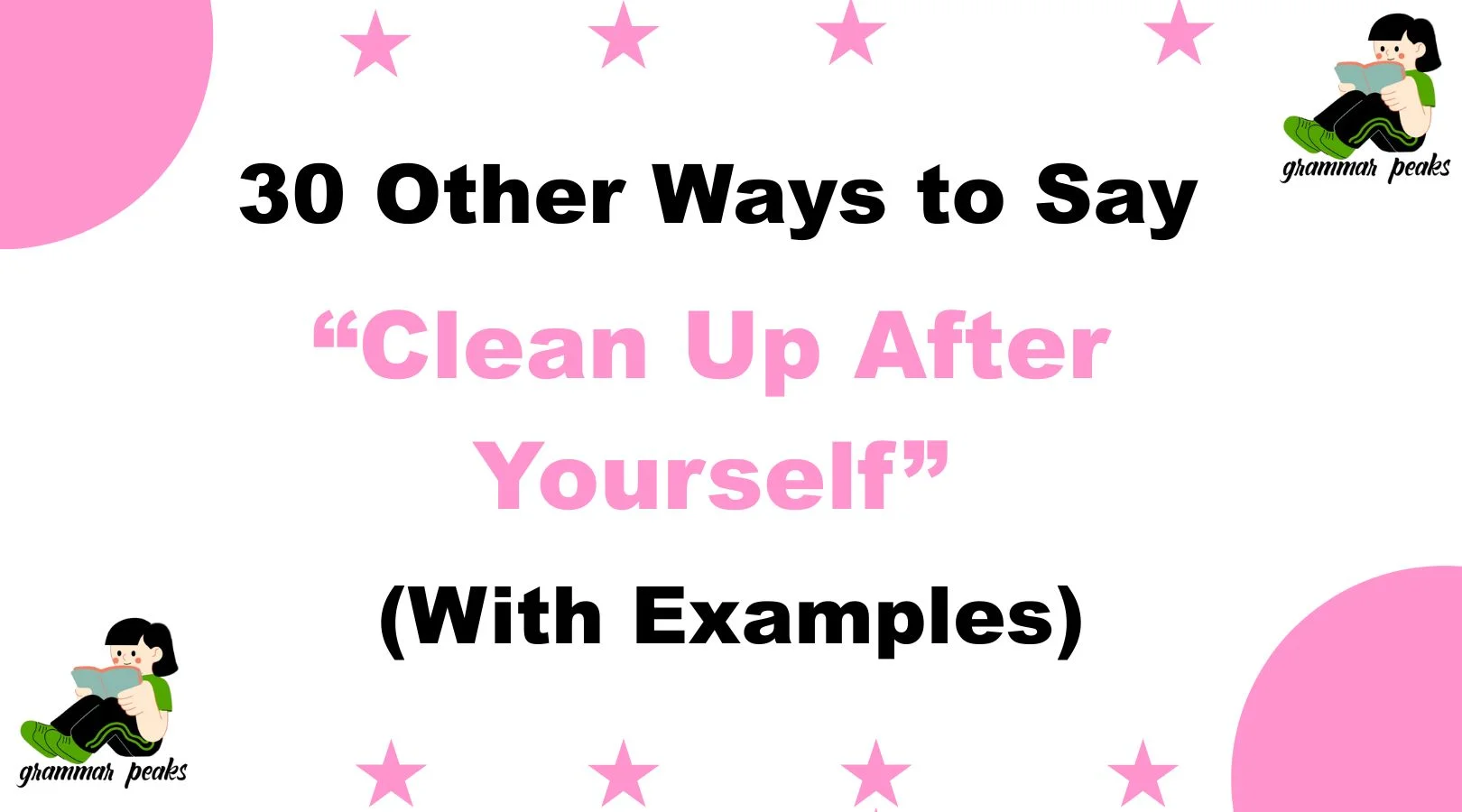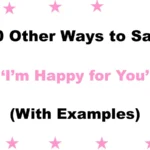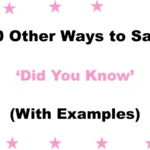Keeping shared spaces tidy shows respect, responsibility, and consideration for others. But saying “Clean up after yourself” can sometimes come off as blunt or harsh—especially in works paces, homes, or public settings.
That’s why it’s helpful to have more tactful or creative ways to encourage cleanliness without offending or sounding overly authoritative.
Whether you’re managing a household, leading a team, or addressing roommates or students, the alternatives below will help you express the same message with the right tone.
What Does “Clean Up After Yourself” Mean?
“Clean up after yourself” means you are responsible for tidying up any mess you’ve made—putting away items, disposing of trash, and leaving a space as you found it. It emphasizes accountability for one’s actions in shared or private environments.
When to Use “Clean Up After Yourself”
Use this phrase when:
- Someone has left a mess or disorganization after using a space
- You want to remind someone of their personal responsibility
- You’re enforcing rules in shared living spaces, offices, or classrooms
Is It Professional/Polite to Say “Clean Up After Yourself”?
While it’s clear and direct, “clean up after yourself” can sound too commanding or parental in some situations. In professional or sensitive environments, choosing a softer or more diplomatic alternative may be better received.
Pros and Cons
Pros:
- Direct and easy to understand
- Emphasizes personal responsibility
- Works well in casual or family settings
Cons:
- Can sound rude or accusatory if not said with care
- Might offend adults or colleagues if tone isn’t softened
- May not encourage a positive response in group environments
Synonyms For “Clean Up After Yourself”:
- Please remember to tidy up when you’re done
- Let’s keep this space neat for everyone
- Kindly clean up after yourself
- Let’s leave this area as we found it
- Please put things back where they belong
- Make sure to leave things tidy
- Help keep this space clean
- Don’t forget to pick up after yourself
- Let’s respect each other by cleaning up
- Please be mindful of the mess left behind
- Let’s all do our part to keep things clean
- Please leave the area how you found it
- Can you take a minute to clean that up?
- It’d be great if you could tidy that up
- Please take responsibility for your mess
- We’d appreciate it if you cleaned up after using this area
- Help us keep this place looking good
- Let’s keep it nice for the next person
- Do your part to keep things tidy
- A quick clean goes a long way
- Please wipe things down when you’re finished
- Let’s keep the area presentable
- Don’t leave a mess behind
- Keep your space in order
- Don’t forget to take care of your mess
- Could you please clean up before you go?
- Be sure to leave things clean
- We all benefit from a clean space
- Please take a moment to tidy up
1. Please Remember to Tidy Up When You’re Done
Definition: A polite reminder to clean up after completing an activity.
Detailed Explanation: This phrase avoids blame and gently encourages responsibility.
Scenario Example: “After using the meeting room, please remember to tidy up when you’re done.”
Best Use: In professional or shared environments like offices, classrooms, or events.
Worst Use: When you need immediate action and directness is necessary.
Tone: Polite, respectful.
2. Let’s Keep This Space Neat for Everyone
Definition: A collaborative appeal to maintain cleanliness.
Detailed Explanation: This encourages shared responsibility without singling anyone out.
Scenario Example: “Let’s keep this space neat for everyone using the kitchen.”
Best Use: Group settings like office break rooms or shared homes.
Worst Use: One-on-one reminders when a single person is the issue.
Tone: Inclusive, team-oriented.
3. Kindly Clean Up After Yourself
Definition: A direct request softened with courtesy.
Detailed Explanation: Adds “kindly” to keep the message firm but polite.
Scenario Example: “Kindly clean up after yourself once you’re finished using the tools.”
Best Use: In notices, signs, or professional settings.
Worst Use: Casual home settings, where it may sound too formal.
Tone: Polite yet firm.
4. Let’s Leave This Area As We Found It
Definition: A respectful way to suggest maintaining the original state of a space.
Detailed Explanation: This neutral phrasing avoids direct confrontation.
Scenario Example: “Before leaving the kitchen, let’s leave this area as we found it.”
Best Use: When addressing a group or setting shared expectations.
Worst Use: With children or individuals who need clear instructions.
Tone: Neutral, respectful.
5. Please Put Things Back Where They Belong
Definition: A specific request to return items to their proper place.
Detailed Explanation: Targets disorganization without being too critical.
Scenario Example: “After the meeting, please put things back where they belong.”
Best Use: Office or team settings.
Worst Use: Informal conversations where it might feel too structured.
Tone: Courteous, instructional.
6. Make Sure to Leave Things Tidy
Definition: A friendly way to suggest post-activity cleanup.
Detailed Explanation: Focuses on the result rather than blaming the person.
Scenario Example: “Before you leave the classroom, make sure to leave things tidy.”
Best Use: With students or younger audiences.
Worst Use: When more assertiveness is needed.
Tone: Gentle, encouraging.
7. Help Keep This Space Clean
Definition: A group-centered appeal to promote cleanliness.
Detailed Explanation: Invites shared effort without assigning blame.
Scenario Example: “Please help keep this space clean for others.”
Best Use: Posted signs in communal areas.
Worst Use: When addressing someone who repeatedly neglects to clean.
Tone: Inclusive, non-confrontational.
8. Don’t Forget to Pick Up After Yourself
Definition: A light reminder to clean up one’s personal mess.
Detailed Explanation: Works well as a casual reminder among peers or family.
Scenario Example: “Hey, don’t forget to pick up after yourself before heading out.”
Best Use: With roommates, friends, or children.
Worst Use: In professional or formal environments.
Tone: Casual, friendly.
9. Let’s Respect Each Other by Cleaning Up
Definition: Connects cleanliness with mutual respect.
Detailed Explanation: A values-based message that frames cleaning as thoughtful behavior.
Scenario Example: “Let’s respect each other by cleaning up after meetings.”
Best Use: For creating a values-driven workplace or home culture.
Worst Use: Where tone may come across as moralizing.
Tone: Positive, values-based.
10. Please Be Mindful of the Mess Left Behind
Definition: A gentle call for awareness of leftover clutter.
Detailed Explanation: Encourages reflection without directly calling someone out.
Scenario Example: “Please be mindful of the mess left behind in the lunch area.”
Best Use: Subtle reminders in communal or public areas.
Worst Use: When someone needs direct accountability.
Tone: Indirect, thoughtful.
11. Let’s All Do Our Part to Keep Things Clean
Definition: Encourages shared responsibility for cleanliness.
Detailed Explanation: This phrase spreads accountability evenly across a group, reducing the chance of anyone feeling singled out.
Scenario Example: “Before we head out, let’s all do our part to keep things clean.”
Best Use: Office teams, school groups, or roommates.
Worst Use: When a specific person needs to be held accountable.
Tone: Inclusive, team-building.
12. Please Leave the Area How You Found It
Definition: A request to return the space to its original condition.
Detailed Explanation: It sets a respectful standard for shared spaces and implies personal accountability.
Scenario Example: “Before leaving the kitchen, please leave the area how you found it.”
Best Use: Kitchens, meeting rooms, or bathrooms.
Worst Use: When someone hasn’t seen the original state.
Tone: Polite, neutral.
13. Can You Take a Minute to Clean That Up?
Definition: A casual yet respectful request to clean something left behind.
Detailed Explanation: Framed as a small favor, this phrase invites cooperation.
Scenario Example: “Hey, can you take a minute to clean that up before you go?”
Best Use: One-on-one interactions, casual environments.
Worst Use: In formal signage or group reminders.
Tone: Friendly, conversational.
14. It’d Be Great If You Could Tidy That Up
Definition: A soft request emphasizing helpfulness.
Detailed Explanation: It frames the request as optional, creating a more positive atmosphere.
Scenario Example: “It’d be great if you could tidy that up after lunch.”
Best Use: Peer-to-peer interactions, team environments.
Worst Use: When strict compliance is required.
Tone: Warm, gentle.
15. Please Take Responsibility for Your Mess
Definition: A direct statement that emphasizes accountability.
Detailed Explanation: Used when a clear message needs to be delivered, often after repeated issues.
Scenario Example: “Please take responsibility for your mess in the lounge.”
Best Use: When the behavior is habitual and needs correction.
Worst Use: In group settings where the source of the mess is unclear.
Tone: Assertive, corrective.
16. We’d Appreciate It If You Cleaned Up After Using This Area
Definition: A polite group-voiced request.
Detailed Explanation: This makes the request sound more courteous and collective.
Scenario Example: “We’d appreciate it if you cleaned up after using the copy room.”
Best Use: Office or shared workspaces.
Worst Use: In casual or family settings where formality isn’t needed.
Tone: Formal, respectful.
17. Help Us Keep This Place Looking Good
Definition: A positive appeal to shared pride and effort.
Detailed Explanation: Emphasizes aesthetics and shared standards over cleanliness alone.
Scenario Example: “Help us keep this place looking good by putting your dishes away.”
Best Use: Public spaces or workspaces with many users.
Worst Use: Where clarity is more important than style.
Tone: Uplifting, positive.
18. Let’s Keep It Nice for the Next Person
Definition: A friendly reminder to consider others.
Detailed Explanation: Uses empathy to encourage tidiness by imagining others’ needs.
Scenario Example: “Let’s keep it nice for the next person by wiping the counter down.”
Best Use: Shared bathrooms, break rooms, or hot desks.
Worst Use: When immediate cleanup is non-negotiable.
Tone: Considerate, cooperative.
19. Do Your Part to Keep Things Tidy
Definition: Encourages individual contribution to group cleanliness.
Detailed Explanation: Stresses that everyone has a role to play without assigning blame.
Scenario Example: “Please do your part to keep things tidy around the workspace.”
Best Use: Community spaces and team environments.
Worst Use: One-on-one situations where clarity is better.
Tone: Motivational, fair.
20. A Quick Clean Goes a Long Way
Definition: A positive phrase highlighting the benefit of a small action.
Detailed Explanation: Reframes tidying as a simple task with meaningful impact.
Scenario Example: “Before you go, a quick clean goes a long way in keeping this space usable.”
Best Use: Posters or group-friendly reminders.
Worst Use: With individuals needing strict instruction.
Tone: Encouraging, optimistic.
21. Please Wipe Things Down When You’re Finished
Definition: A clear and simple request to clean surfaces after use.
Detailed Explanation: Directs attention to cleanliness without being rude.
Scenario Example: “After lunch, please wipe things down when you’re finished.”
Best Use: Kitchens, shared counters, break rooms.
Worst Use: In situations where the mess is larger than surface-level.
Tone: Clear, polite.
22. Let’s Keep the Area Presentable
Definition: Encourages maintaining a neat and professional look.
Detailed Explanation: Suggests that the space reflects on everyone who uses it.
Scenario Example: “Let’s keep the area presentable for our visitors.”
Best Use: Reception areas, conference rooms.
Worst Use: When speaking with children or informal groups.
Tone: Formal, professional.
23. Don’t Leave a Mess Behind
Definition: A firm warning or reminder not to leave clutter or disarray.
Detailed Explanation: Blunt but effective when someone has a habit of being messy.
Scenario Example: “Please don’t leave a mess behind after cooking.”
Best Use: When setting firm boundaries.
Worst Use: With guests or new employees—it may come off too strong.
Tone: Direct, no-nonsense.
24. Keep Your Space in Order
Definition: A personal appeal to manage one’s own area responsibly.
Detailed Explanation: Encourages self-discipline rather than external correction.
Scenario Example: “Employees are expected to keep their space in order.”
Best Use: Offices, desks, workshops.
Worst Use: Shared communal messes.
Tone: Professional, personal accountability.
25. Don’t Forget to Take Care of Your Mess
Definition: A gentle reminder that cleaning is part of finishing a task.
Detailed Explanation: Adds a caring tone to a direct message.
Scenario Example: “Before you leave, don’t forget to take care of your mess.”
Best Use: Informal settings—home, friends, roommates.
Worst Use: In highly formal or written contexts.
Tone: Friendly, informal.
26. Could You Please Clean Up Before You Go?
Definition: A respectful and polite prompt for action.
Detailed Explanation: Expresses a request clearly with soft language.
Scenario Example: “Could you please clean up before you go?”
Best Use: Households, offices, classrooms.
Worst Use: For posted signs—better suited to direct conversation.
Tone: Courteous, diplomatic.
27. Be Sure to Leave Things Clean
Definition: A confident, proactive request for cleanliness.
Detailed Explanation: Implies a standard to be met before leaving.
Scenario Example: “Be sure to leave things clean after your shift.”
Best Use: Work environments, kitchens, shared homes.
Worst Use: With guests—it may feel too commanding.
Tone: Confident, slightly formal.
28. We All Benefit From a Clean Space
Definition: Highlights mutual value in keeping areas tidy.
Detailed Explanation: Creates a sense of community ownership and respect.
Scenario Example: “Let’s remember that we all benefit from a clean space.”
Best Use: Shared offices, classrooms, lounges.
Worst Use: When direct instruction is necessary.
Tone: Inspirational, community-focused.
29. Please Take a Moment to Tidy Up
Definition: A respectful, time-sensitive suggestion.
Detailed Explanation: Makes cleaning sound like a quick and easy task.
Scenario Example: “Before heading out, please take a moment to tidy up.”
Best Use: For informal yet respectful communication.
Worst Use: When a large mess needs specific instructions.
Tone: Light, kind.
30. Let’s All Pitch In and Keep It Clean
Definition: Encourages collective action for cleanliness.
Detailed Explanation: Builds a culture of cooperation and fairness.
Scenario Example: “Let’s all pitch in and keep it clean after lunch.”
Best Use: Schools, shared homes, group teams.
Worst Use: Where individual accountability is needed.
Tone: Motivational, collaborative.
Conclusion: Choosing the Right Way to Say “Clean Up After Yourself”
Finding the right words to remind someone to clean up can make all the difference between a tense exchange and a respectful conversation. Whether you’re leading a team, managing a household, or maintaining a shared space, the phrases above give you the flexibility to encourage responsibility without sounding harsh or confrontational. From casual to formal, from gentle nudges to firm expectations, these 30 alternatives can help you set the right tone for cleanliness, respect, and cooperation.
When you ask someone to tidy up using words that are thoughtful and tactful, you’re not just preventing mess—you’re promoting a healthier, more respectful environment for everyone involved.
Frequently Asked Questions
Q1. What is a polite way to say “Clean up after yourself”?
A polite way to say it is “Please tidy up when you’re done” or “Let’s keep this space neat for everyone.” These versions are more friendly and less likely to cause offense.
Q2. How can I ask someone to clean without sounding rude?
Use inclusive or gentle language like:
- “Let’s leave the area as we found it.”
- “Could you please clean up before you go?”
These reduce the chance of conflict and promote cooperation.
Q3. Is it professional to say “Clean up after yourself” at work?
It depends on the tone. While the phrase is clear, you can make it more professional by saying:
- “We’d appreciate it if you cleaned up after using this space.”
- “Let’s all do our part to keep things clean.”
Q4. What’s the best way to remind kids to clean up after themselves?
With kids, keep it friendly and consistent:
- “Don’t forget to pick up after yourself.”
- “Let’s leave the room looking nice!”

Mia Rose is a passionate Language Coach and Contributor at GrammarPeaks, where she specializes in practical grammar tips and language learning strategies. With a strong foundation in education and communication, Mia brings a friendly, approachable style to her writing. Her goal is to make complex grammar rules simple and usable for learners at any level, helping them grow in both confidence and fluency.





